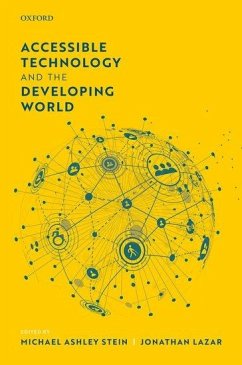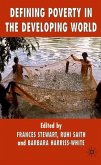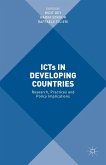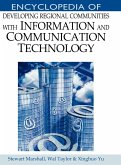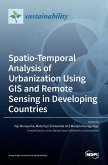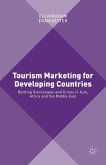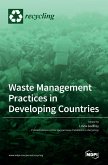Accessible Technology and the Developing World
Herausgeber: Stein, Michael Ashley; Lazar, Jonathan
Accessible Technology and the Developing World
Herausgeber: Stein, Michael Ashley; Lazar, Jonathan
- Gebundenes Buch
- Merkliste
- Auf die Merkliste
- Bewerten Bewerten
- Teilen
- Produkt teilen
- Produkterinnerung
- Produkterinnerung
This book brings together a unique combination of contributors with diverse disciplinary backgrounds from both the developing and developed world. Together, they present a unique and much needed review of this critical and growing area of work.
Andere Kunden interessierten sich auch für
![Defining Poverty in the Developing World Defining Poverty in the Developing World]() Frances Stewart / Ruhi saith / Barbara Harriss-WhiteDefining Poverty in the Developing World37,99 €
Frances Stewart / Ruhi saith / Barbara Harriss-WhiteDefining Poverty in the Developing World37,99 €![Icts in Developing Countries Icts in Developing Countries]() Icts in Developing Countries81,99 €
Icts in Developing Countries81,99 €![Encyclopedia of Developing Regional Communities with Information and Communication Technology Encyclopedia of Developing Regional Communities with Information and Communication Technology]() Encyclopedia of Developing Regional Communities with Information and Communication Technology273,99 €
Encyclopedia of Developing Regional Communities with Information and Communication Technology273,99 €![Spatio-Temporal Analysis of Urbanization Using GIS and Remote Sensing in Developing Countries Spatio-Temporal Analysis of Urbanization Using GIS and Remote Sensing in Developing Countries]() Spatio-Temporal Analysis of Urbanization Using GIS and Remote Sensing in Developing Countries104,99 €
Spatio-Temporal Analysis of Urbanization Using GIS and Remote Sensing in Developing Countries104,99 €![Food Innovation as a Means of Developing Healthier and More Sustainable Foods Food Innovation as a Means of Developing Healthier and More Sustainable Foods]() Food Innovation as a Means of Developing Healthier and More Sustainable Foods64,99 €
Food Innovation as a Means of Developing Healthier and More Sustainable Foods64,99 €![Tourism Marketing for Developing Countries Tourism Marketing for Developing Countries]() Eli AvrahamTourism Marketing for Developing Countries81,99 €
Eli AvrahamTourism Marketing for Developing Countries81,99 €![Waste Management Practices in Developing Countries Waste Management Practices in Developing Countries]() Waste Management Practices in Developing Countries118,99 €
Waste Management Practices in Developing Countries118,99 €-
-
-
This book brings together a unique combination of contributors with diverse disciplinary backgrounds from both the developing and developed world. Together, they present a unique and much needed review of this critical and growing area of work.
Hinweis: Dieser Artikel kann nur an eine deutsche Lieferadresse ausgeliefert werden.
Hinweis: Dieser Artikel kann nur an eine deutsche Lieferadresse ausgeliefert werden.
Produktdetails
- Produktdetails
- Verlag: Hurst & Co.
- Seitenzahl: 384
- Erscheinungstermin: 21. Januar 2022
- Englisch
- Abmessung: 231mm x 157mm x 25mm
- Gewicht: 771g
- ISBN-13: 9780198846413
- ISBN-10: 019884641X
- Artikelnr.: 62045548
- Herstellerkennzeichnung
- Produktsicherheitsverantwortliche/r
- Europaallee 1
- 36244 Bad Hersfeld
- gpsr@libri.de
- Verlag: Hurst & Co.
- Seitenzahl: 384
- Erscheinungstermin: 21. Januar 2022
- Englisch
- Abmessung: 231mm x 157mm x 25mm
- Gewicht: 771g
- ISBN-13: 9780198846413
- ISBN-10: 019884641X
- Artikelnr.: 62045548
- Herstellerkennzeichnung
- Produktsicherheitsverantwortliche/r
- Europaallee 1
- 36244 Bad Hersfeld
- gpsr@libri.de
Professor Michael Ashley Stein is the co-founder and Executive Director of the Harvard Law School Project on Disability, and a Visiting Professor at Harvard Law School since 2005. Considered one of the world's leading experts on disability law and policy, Dr. Stein participated in the drafting of the UN Convention on the Rights of Persons with Disabilities; works with disabled peoples' organizations and non-governmental organizations around the world; actively consults with governments on their disability laws and policies; advises an array of UN bodies and national human rights institutions; and has brought landmark disability rights litigation globally. Jonathan Lazar, PhD, LLM is a professor in the College of Information Studies (iSchool) at the University of Maryland. Dr Lazar joined the iSchool in 2019, after 19 years as a professor of computer and information sciences at Towson University, where he served as director of the information systems program for 14 years.
* 1: Jonathan Lazar, University of Maryland, and Michael Ashley Stein,
Harvard Law School: Introduction
* 2: Marianne Schulze: Development for All: How Human Rights Break Down
Barriers to Technology
* 3: Charlotte McClain-Nhlapo and Deepti Samant Raja, World Bank:
Addressing the Drivers of Digital Technology for Disability-Inclusive
Development Funding
* 4: H.E. Luis Gallegos, Martin Gould, and Axel Leblois, Global
Initiative for Inclusive Information and Communication Technologies
(G3ict): Global Trends for Accessible Technologies in the Developing
World: An Analysis of the Results of the Digital Accessibility Rights
Evaluation Index
* 5: Francesca Cesa Bianchi, Global Initiative for Inclusive
Information and Communication Technologies (G3ict): Digital
Accessibility Innovation in Latin America and the Caribbean
* 6: Nirmita Narasimhan, Global Initiative for Inclusive Information
and Communication Technologies (G3ict): Digital Accessibility in the
Asia Pacific Region
* 7: Judy Brewer and Shadi Abou-Zahra, World Wide Web Consortium (W3C):
The Role of Technical Standards in Improving Digital Accessibility in
Under-Resources Regions and Communities
* 8: Betsy Beaumon, Benetech: Digital Inclusion in the Global South:
Work Globally, Act Locally
* 9: G. Anthony Giannoumis and Rannveig A. Skjerve, Oslo Metropolitan
University: Digital Accessibility and Intersectional Discrimination
* 10: Paul Harpur, University of Queensland (Australia) and Michael
Ashley Stein, Harvard Law School: The Relevance of the CRPD and the
Marrakesh Treaty to the Global South's Book Famine
* 11: Amy L. Landers, Drexel University: The Patent System, Assistive
Technologies, and the Developing World
* 12: Marva Khan, Muhammad Atif Sheikh, and Abia Akram, Lahore
University of Management Sciences and Special Talent Exchange
Program, Pakistan: Accessible ICT as a Ray of Hope for Disability
Rights in Pakistan
* 13: Minverva Chavarria, A. Mugeere, K. Schönenberger, S. Hurst, M.
Rivas Velarde, University of Geneva and Makerere University: Design
Approaches for Creating Person-centered, Context Sensitive, and
Sustainable Assistive Technology with the Global South
* 14: Manohar Swaminathan and Joyojeet Pal, Microsoft Research India:
Ludic Design for Accessibility in the Global South
* 15: Sachin Pavithran, U.S. Access Board and Utah State University: A
Multi-country Comparison of ICT and Educational Accessibility for
Blind Students
* 16: Vaishnav Kameswaran, University of Michigan, and Joyojeet Pal,
Microsoft Research India: Ride-hailing as Accessible Transit: A Case
Study of Blind Users in India
* 17: Patrick Ojok, Kyambogo University: The Role of Ugandan Public
Universities in Promoting Accessible Information and Communication
Technology
* 18: Raja Kushalnagar, Gallaudet University: Accessible Mobile Banking
in India
Harvard Law School: Introduction
* 2: Marianne Schulze: Development for All: How Human Rights Break Down
Barriers to Technology
* 3: Charlotte McClain-Nhlapo and Deepti Samant Raja, World Bank:
Addressing the Drivers of Digital Technology for Disability-Inclusive
Development Funding
* 4: H.E. Luis Gallegos, Martin Gould, and Axel Leblois, Global
Initiative for Inclusive Information and Communication Technologies
(G3ict): Global Trends for Accessible Technologies in the Developing
World: An Analysis of the Results of the Digital Accessibility Rights
Evaluation Index
* 5: Francesca Cesa Bianchi, Global Initiative for Inclusive
Information and Communication Technologies (G3ict): Digital
Accessibility Innovation in Latin America and the Caribbean
* 6: Nirmita Narasimhan, Global Initiative for Inclusive Information
and Communication Technologies (G3ict): Digital Accessibility in the
Asia Pacific Region
* 7: Judy Brewer and Shadi Abou-Zahra, World Wide Web Consortium (W3C):
The Role of Technical Standards in Improving Digital Accessibility in
Under-Resources Regions and Communities
* 8: Betsy Beaumon, Benetech: Digital Inclusion in the Global South:
Work Globally, Act Locally
* 9: G. Anthony Giannoumis and Rannveig A. Skjerve, Oslo Metropolitan
University: Digital Accessibility and Intersectional Discrimination
* 10: Paul Harpur, University of Queensland (Australia) and Michael
Ashley Stein, Harvard Law School: The Relevance of the CRPD and the
Marrakesh Treaty to the Global South's Book Famine
* 11: Amy L. Landers, Drexel University: The Patent System, Assistive
Technologies, and the Developing World
* 12: Marva Khan, Muhammad Atif Sheikh, and Abia Akram, Lahore
University of Management Sciences and Special Talent Exchange
Program, Pakistan: Accessible ICT as a Ray of Hope for Disability
Rights in Pakistan
* 13: Minverva Chavarria, A. Mugeere, K. Schönenberger, S. Hurst, M.
Rivas Velarde, University of Geneva and Makerere University: Design
Approaches for Creating Person-centered, Context Sensitive, and
Sustainable Assistive Technology with the Global South
* 14: Manohar Swaminathan and Joyojeet Pal, Microsoft Research India:
Ludic Design for Accessibility in the Global South
* 15: Sachin Pavithran, U.S. Access Board and Utah State University: A
Multi-country Comparison of ICT and Educational Accessibility for
Blind Students
* 16: Vaishnav Kameswaran, University of Michigan, and Joyojeet Pal,
Microsoft Research India: Ride-hailing as Accessible Transit: A Case
Study of Blind Users in India
* 17: Patrick Ojok, Kyambogo University: The Role of Ugandan Public
Universities in Promoting Accessible Information and Communication
Technology
* 18: Raja Kushalnagar, Gallaudet University: Accessible Mobile Banking
in India
* 1: Jonathan Lazar, University of Maryland, and Michael Ashley Stein,
Harvard Law School: Introduction
* 2: Marianne Schulze: Development for All: How Human Rights Break Down
Barriers to Technology
* 3: Charlotte McClain-Nhlapo and Deepti Samant Raja, World Bank:
Addressing the Drivers of Digital Technology for Disability-Inclusive
Development Funding
* 4: H.E. Luis Gallegos, Martin Gould, and Axel Leblois, Global
Initiative for Inclusive Information and Communication Technologies
(G3ict): Global Trends for Accessible Technologies in the Developing
World: An Analysis of the Results of the Digital Accessibility Rights
Evaluation Index
* 5: Francesca Cesa Bianchi, Global Initiative for Inclusive
Information and Communication Technologies (G3ict): Digital
Accessibility Innovation in Latin America and the Caribbean
* 6: Nirmita Narasimhan, Global Initiative for Inclusive Information
and Communication Technologies (G3ict): Digital Accessibility in the
Asia Pacific Region
* 7: Judy Brewer and Shadi Abou-Zahra, World Wide Web Consortium (W3C):
The Role of Technical Standards in Improving Digital Accessibility in
Under-Resources Regions and Communities
* 8: Betsy Beaumon, Benetech: Digital Inclusion in the Global South:
Work Globally, Act Locally
* 9: G. Anthony Giannoumis and Rannveig A. Skjerve, Oslo Metropolitan
University: Digital Accessibility and Intersectional Discrimination
* 10: Paul Harpur, University of Queensland (Australia) and Michael
Ashley Stein, Harvard Law School: The Relevance of the CRPD and the
Marrakesh Treaty to the Global South's Book Famine
* 11: Amy L. Landers, Drexel University: The Patent System, Assistive
Technologies, and the Developing World
* 12: Marva Khan, Muhammad Atif Sheikh, and Abia Akram, Lahore
University of Management Sciences and Special Talent Exchange
Program, Pakistan: Accessible ICT as a Ray of Hope for Disability
Rights in Pakistan
* 13: Minverva Chavarria, A. Mugeere, K. Schönenberger, S. Hurst, M.
Rivas Velarde, University of Geneva and Makerere University: Design
Approaches for Creating Person-centered, Context Sensitive, and
Sustainable Assistive Technology with the Global South
* 14: Manohar Swaminathan and Joyojeet Pal, Microsoft Research India:
Ludic Design for Accessibility in the Global South
* 15: Sachin Pavithran, U.S. Access Board and Utah State University: A
Multi-country Comparison of ICT and Educational Accessibility for
Blind Students
* 16: Vaishnav Kameswaran, University of Michigan, and Joyojeet Pal,
Microsoft Research India: Ride-hailing as Accessible Transit: A Case
Study of Blind Users in India
* 17: Patrick Ojok, Kyambogo University: The Role of Ugandan Public
Universities in Promoting Accessible Information and Communication
Technology
* 18: Raja Kushalnagar, Gallaudet University: Accessible Mobile Banking
in India
Harvard Law School: Introduction
* 2: Marianne Schulze: Development for All: How Human Rights Break Down
Barriers to Technology
* 3: Charlotte McClain-Nhlapo and Deepti Samant Raja, World Bank:
Addressing the Drivers of Digital Technology for Disability-Inclusive
Development Funding
* 4: H.E. Luis Gallegos, Martin Gould, and Axel Leblois, Global
Initiative for Inclusive Information and Communication Technologies
(G3ict): Global Trends for Accessible Technologies in the Developing
World: An Analysis of the Results of the Digital Accessibility Rights
Evaluation Index
* 5: Francesca Cesa Bianchi, Global Initiative for Inclusive
Information and Communication Technologies (G3ict): Digital
Accessibility Innovation in Latin America and the Caribbean
* 6: Nirmita Narasimhan, Global Initiative for Inclusive Information
and Communication Technologies (G3ict): Digital Accessibility in the
Asia Pacific Region
* 7: Judy Brewer and Shadi Abou-Zahra, World Wide Web Consortium (W3C):
The Role of Technical Standards in Improving Digital Accessibility in
Under-Resources Regions and Communities
* 8: Betsy Beaumon, Benetech: Digital Inclusion in the Global South:
Work Globally, Act Locally
* 9: G. Anthony Giannoumis and Rannveig A. Skjerve, Oslo Metropolitan
University: Digital Accessibility and Intersectional Discrimination
* 10: Paul Harpur, University of Queensland (Australia) and Michael
Ashley Stein, Harvard Law School: The Relevance of the CRPD and the
Marrakesh Treaty to the Global South's Book Famine
* 11: Amy L. Landers, Drexel University: The Patent System, Assistive
Technologies, and the Developing World
* 12: Marva Khan, Muhammad Atif Sheikh, and Abia Akram, Lahore
University of Management Sciences and Special Talent Exchange
Program, Pakistan: Accessible ICT as a Ray of Hope for Disability
Rights in Pakistan
* 13: Minverva Chavarria, A. Mugeere, K. Schönenberger, S. Hurst, M.
Rivas Velarde, University of Geneva and Makerere University: Design
Approaches for Creating Person-centered, Context Sensitive, and
Sustainable Assistive Technology with the Global South
* 14: Manohar Swaminathan and Joyojeet Pal, Microsoft Research India:
Ludic Design for Accessibility in the Global South
* 15: Sachin Pavithran, U.S. Access Board and Utah State University: A
Multi-country Comparison of ICT and Educational Accessibility for
Blind Students
* 16: Vaishnav Kameswaran, University of Michigan, and Joyojeet Pal,
Microsoft Research India: Ride-hailing as Accessible Transit: A Case
Study of Blind Users in India
* 17: Patrick Ojok, Kyambogo University: The Role of Ugandan Public
Universities in Promoting Accessible Information and Communication
Technology
* 18: Raja Kushalnagar, Gallaudet University: Accessible Mobile Banking
in India

